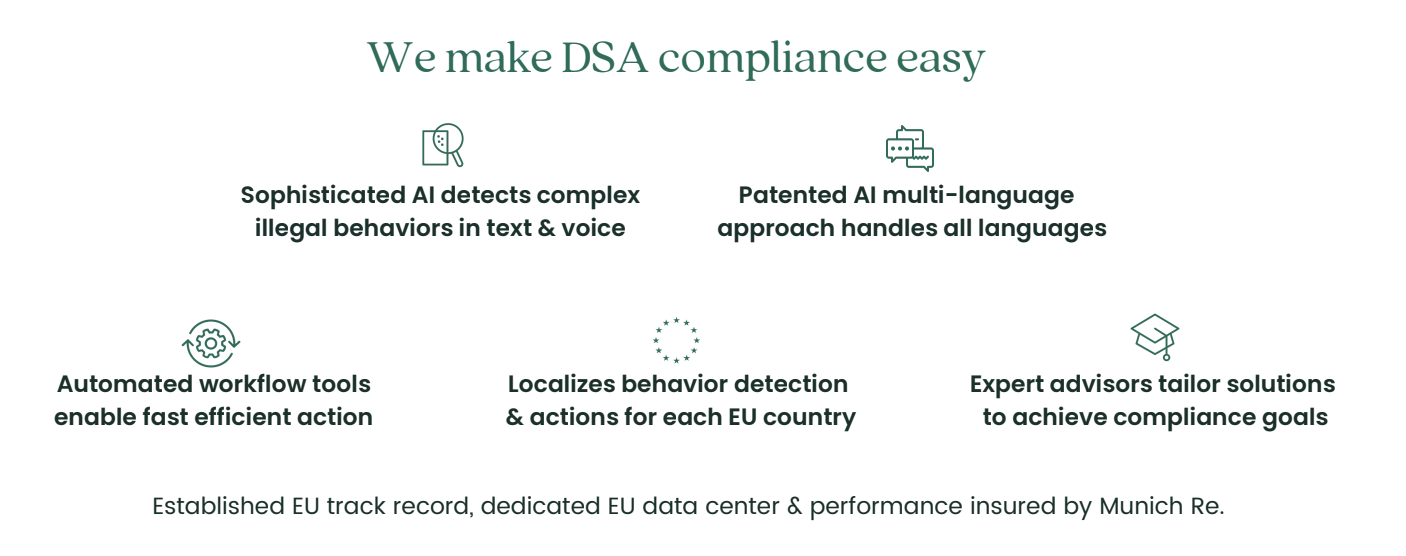
Less than a year from now – on January 1, 2024 – any online platform or service with a presence in the European Union will need to comply with the Digital Services Act. Simply put: If you want your website or app to load for users in the EU, you must comply with the DSA or face fines of up to 6% of your annual company revenue.
But what exactly does DSA compliance entail?
Transparency Reports
We've previously documented the major DSA requirements for online platforms or services. One of those obligations is to publish regular transparency reports of certain data and metrics demonstrating continued compliance with the DSA.
The specific data and metric requirements differ for various types of online services, but they break down like this per DSA provisions:
- Intermediary Service Providers (Article 13): These include internet service providers, DNS providers, VoIP apps, messaging apps, and email service providers.
Under the DSA, intermediary service providers are required to publish the following information in a "clear, easily comprehensible, and detailed report" once a year:
- All orders from EU member states to act against illegal content, including:
- The specific type of illegal content.
- Which member state submitted the order.
- Average time it took to act on each order.
- The number of general notices (e.g., By trusted flaggers.) submitted about content:
- Categorized by the type of content.
- Action taken against the content, differentiating between actions taken on basis of law and on basis of terms & conditions.
- Number of notices processed by automated means.
- Average time it took to act on each notice .
- Content moderation done at the provider's own initiative:
- Information about automated moderation tools.
- Training and assistance provided to content moderators.
- The number and types of measures taken that affect the availability, visibility, and accessibility of content that users of the service post.
- Complaints received through the service's own internal complaint system:
- The basis of why each complaint was filed.
- Decisions taken upon each complaint.
- Average time it took to act on each complaint.
- Number of instances where original decisions were reversed.
- Details about automated content moderation processes:
- Description of each automated tool that is used.
- Specify the precise purpose of each tool.
- Provide information on automated tools' accuracy, including error rates.
- Explain safeguards that are in place for each automated tool.
- All orders from EU member states to act against illegal content, including:
- Online Platforms (Article 23): This refers to social networks, online marketplaces, app stores, travel booking sites, and any site where user-generated content can be shared.
Along with all the information mentioned above (for intermediary service providers), online platforms are required to publish the following once a year:
- The number of disputes settled out of court:
- Outcomes of each dispute settlement.
- Average time taken to settle each dispute.
- Percentage of disputes where the platform implemented the decision of the out-of-court settlement body.
- Suspensions imposed by the platform against users:
- Differentiate between suspensions imposed due to illegal content and content that didn't break the law but violated platform terms & conditions.
- Suspensions imposed for submitting unfounded (blatantly false) notices.
- Suspensions imposed for submitting unfounded internal complaints.
- The number of disputes settled out of court:
How Spectrum Labs can help with DSA compliance
Spectrum Labs' solutions thoroughly cover the requirements of the DSA, such as the detection of illegal content and the management of fully auditable Trust & Safety systems. By combining advanced Contextual AI detection with enterprise-scale solutions, Spectrum Labs is able to help online platforms and services of any size ensure compliance with EU regulations.

Spectrum Labs also helps create in-depth transparency reports.
Through 360° analytics, Spectrum Labs is able to give a full picture of all activity on a platform. With this abundance of collected data, the process of putting together transparency reports becomes much more streamlined. And it's not just about ease – since the required data and metrics are already baked into the same solution that's monitoring a platform, transparency reports created by Spectrum Labs end up being much more accurate and comprehensive.
In fact, Spectrum Labs has already helped European clients compile transparency reports.
Earlier this year, Spectrum Labs worked with Irish-based mobile gaming site Wildlife Studios to publish a transparency report about content moderation efforts on their platform. Although it wasn't for the DSA, many of the metrics in the Wildlife report apply to the aforementioned EU regulations for reporting harmful activity and actions taken against it:
All in all, Spectrum Labs solutions not only help online platforms ensure compliance with Europe's upcoming DSA but also provide the data and analytics necessary for the law's mandated transparency reports. Spectrum Labs' AI-driven content moderation can recognize and remove illegal content and keep a fully auditable record of actions taken.
To learn more about how Spectrum Labs can help prepare your online platform for EU regulatory compliance, get in touch with us directly or check out our additional resources:
-png-1.png)